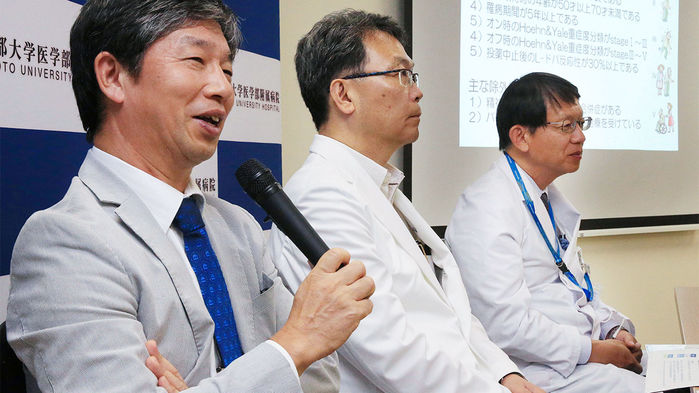In Japan, the world's first clinical trials for the treatment of Parkinson's disease using stem cells began.

Jun Takahashi and his colleagues at a press conference at Kyoto University
On July 30, Japanese researchers announced the world's first clinical trials for the treatment of Parkinson's disease with induced pluripotent stem cells (iPSC). The trial will be attended by seven people aged 50 - 69 years.The research team will introduce patients with precursors of dopaminergic neurons that produce dopamine directly into the area of the brain in which neuron death occurs. Testing is led by Jun Takahashi, a neurosurgeon from the iPSC Center for Learning and Application at Kyoto University (CiRA), in conjunction with Kyoto University Hospital .
"This is the world's first clinical trial of Parkinson's disease treatment using iPSC," said Jun Takahashi at a press conference.
Parkinson's disease develops due to the death of specialized brain cells that produce dopamine. Lack of dopamine leads to a decrease in motor function, difficulty in walking and trembling of the extremities. The development of the disease can lead to dementia. The treatment strategy is to grow the precursors of dopaminergic neurons from iPSC and introduce them into the putamen , a circular structure located at the base of the forebrain. Surgeons drill two small holes in the patient's skull and use a specialized device to inject approximately 5 million cells.
Animal studies have shown that neuron progenitors differentiate into dopaminergic neurons and integrate into the brain. Last year, the Takahashi group reported that monkeys with Parkinson's disease showed significant improvements, continuing for two years after injections of neurons grown from human iPSC. And for all the time they have not recorded the development of tumors.
Instead of using the patient’s own cells, CiRA decided to take them from healthy donors with specific cell types that are less likely to trigger an immune response. “Using cell banks, we can act much faster and cheaper,” CiRA head Cinra Yamanaka told Science magazine in 2017, received in 2012 the Nobel Prize in Physiology and Medicine for the discovery of the method of obtaining iPSC. Just in case, patients will receive immunosuppressants during therapy.
“We intend to conduct our research together with the Kyoto University Hospital so that all patients receive new treatment as soon as possible,” said Yamanaki in a statement.
In Japan, approximately 160,000 people suffer from Parkinson's disease. In many patients, symptoms develop at the age of 50 years and older, and the number of patients is increasing due to the aging population.
Kosei Hasegawa, head of the Japan Parkinson’s Disease Association, said patients have high hopes for iPSC therapy. Hasegawa said that many people expect to join clinical trials, adding: "I want the method to be recognized and made available to everyone as soon as possible."
Researchers plan to include treatment costs in national health insurance.
Worldwide, approximately 10 million people have Parkinson’s disease. Currently available treatment methods “improve symptoms without slowing down or stopping the progression of the disease,” the Parkinson’s Disease Foundation said in a statement.
But the new treatment is aimed at the real circulation of the disease, and the use of iPSC will allow its use in countries that prohibit the use of embryonic stem cells, for example in Ireland and Latin America.
These are the third human clinical trials using iPSC, approved in Japan. The former used retinal cells derived from iPSC for the treatment of age-related macular degeneration (AMD). They were launched in 2014 at the RIKEN Development Biology Center in Kobe and headed by Masao Takahashi, the wife of Jun Takahashi. Earlier this year, a group from Osaka University in Japan received permission to research using the “patches” from iPSC to treat coronary heart disease.
Links
www.japantimes.co.jp/news/2018/07/30/national/science-health/japan-oks-clinical-trial-ips-cells-parkinsons-treatment
www.channelnewsasia.com/news/health/japan-parkinsons -worlds-first-human-trial-using-stem-cell-10574720
www.reuters.com/article/us-japan-health-parkinsons/japan-scientists-to-use-reprogrammed-stem-cells-to-fight- parkinsons-idUSKBN1KK186
